Pakość
Pakość [ˈpakɔɕt͡ɕ] (German: Pakosch) is a town in Inowrocław County, Kuyavian-Pomeranian Voivodeship, Poland, with 5,798 inhabitants (2004). Town Privileges were given to Pakość on 9 February 1359. The town today counts 5,798 inhabitants (2004). It is located within the historic region of Kuyavia.
Pakość | |
|---|---|
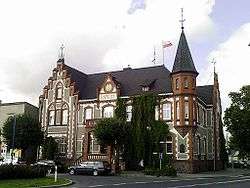 Town hall | |
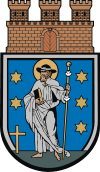 Coat of arms | |
 Pakość  Pakość | |
| Coordinates: 52°48′19″N 18°5′2″E | |
| Country | |
| Voivodeship | Kuyavian-Pomeranian |
| County | Inowrocław |
| Gmina | Pakość |
| First mentioned | 1243 |
| Town rights | 1359 |
| Area | |
| • Total | 3.46 km2 (1.34 sq mi) |
| Population (2006) | |
| • Total | 5,789 |
| • Density | 1,700/km2 (4,300/sq mi) |
| Time zone | UTC+1 (CET) |
| • Summer (DST) | UTC+2 (CEST) |
| Postal code | 88–170 |
| Website | http://www.pakosc.pl |
The town is the main hub of trade and services in the neighbourhood area. Small industry is based here and the town is an important communication and transportation hub.
Pakość is an important centre of worship of the Catholic Church because of the famous calvary – the complex of chapels resembling Jerusalem and commemorating the Passion of Christ.
History
.jpg)
The oldest known mention of Pakość comes from 1243.[1] In 1258 a castle was erected.[1] Town privileges were given to Pakość on 9 February 1359. It was a private town, owned by Polish nobility, administratively located in the Inowrocław Voivodeship in the Greater Poland Province of the Polish Crown. In the 15th and 16th centuries it was a Protestant center.[1] The Działyński noble family founded a Baroque Catholic monastery, which remains one of the landmarks of the town.[1]
Pakość was annexed by Prussia in the First Partition of Poland in 1772. In 1807 it became part of the short-lived Polish Duchy of Warsaw, in 1815 it was re-annexed by Prussia, and in 1871 it became part of Germany. The populace took part in the Greater Poland uprising (1918–19),[1] and Pakość was successfully reintegrated with Poland, after the country regained independence in November 1918.
Gallery
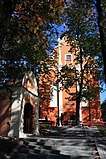 Church of the Crucifixion
Church of the Crucifixion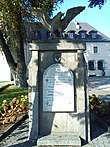 Monument of the Greater Poland uprising
Monument of the Greater Poland uprising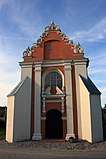 Chapel of the Assumption of Mary
Chapel of the Assumption of Mary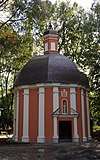 Veronica Chapel
Veronica Chapel Herod's Palace chapel
Herod's Palace chapel
Sport
- Notecianka Pakość – football club
References
- "Pakość". Encyklopedia PWN (in Polish). Retrieved 30 May 2020.
| Wikimedia Commons has media related to Pakość. |